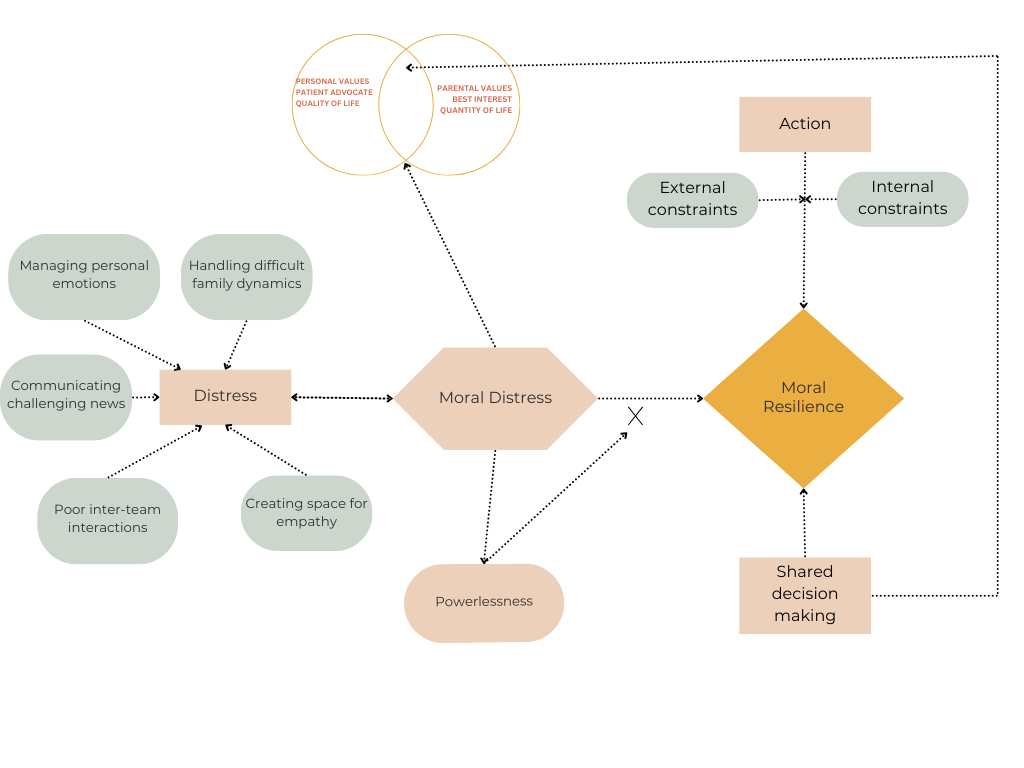Clinical Bioethics
Session: Clinical Bioethics
581 - Moral Distress in Pediatric Trainees: Mapping Experiences, Ethical Guidance, and Challenges in Navigating Ethical Conflicts
Saturday, April 26, 2025
2:30pm - 4:45pm HST
Publication Number: 581.5675
Chinyere O’Connor, UTHealth Houston, Houston, TX, United States; Aymen Mirza, McGovern Medical School at the University of Texas Health Science Center at Houston, Houston, TX, United States; Margarita M.. Ortiz, McGovern Medical School at the University of Texas Health Science Center at Houston, Houston, TX, United States; Nicola Harris, McGovern Medical School at the University of Texas Health Science Center at Houston, Houston, TX, United States; Madelene J. Ottosen, Cizik School of Nursing at University of Texas Health Science Center at Houston, Houston, TX, United States; Terri L. Major-Kincade, UT Health Houston MCGovern Medical School, Richardson, TX, United States
- CO
Chinyere O’Connor, MD
Assistant Professor of Pediatrics
UTHealth Houston
Houston, Texas, United States
Presenting Author(s)
Background: Moral distress occurs when personal values conflict with professional responsibilities. Pediatric residents, who are at the forefront of patient care, frequently experience moral distress; however, research on this issue is acutely lacking.
Objective: Our study explores the core values and moral frameworks that pediatric trainees draw upon when faced with moral-ethical dilemmas.
Design/Methods: This prospective observational study was conducted in two stages: six monthly focus group sessions with pediatric residents during their Pediatric Intensive Care Unit rotation, followed by a large-scale debriefing session for all residents that involved a case encountered in practice of a terminally ill patient. Responses to this case contributed to the creation of a moral distress map (MDM), which identified the emotions experienced, sources of moral distress, and constraints to action faced by residents. The focus groups offered insights into ethical dilemmas residents face and their related challenges. Data from both stages were thematically coded by three independent reviewers to ensure reliability.
Results: There were 22 responses to the focus group questionnaire. Thematic analysis revealed that, to guide ethical decisions, residents placed particular emphasis on patient and/or parent advocacy, personal values, ethical principles, and quality of life. Figure 1 illustrates the inter-related challenges they faced in navigating ethical dilemmas.
Out of 81 residents, 55 responded to the case study, contributing to the creation of a MDM (Fig 2). Emerging sources of moral distress included futile interventions, false hope and lack of control. These factors resulted in emotions such as frustration, anxiety and anger. The MDM identified powerlessness and helplessness as the most common internal constraints to action, while communication challenges and structural hierarchy were common external constraints to action.
Conclusion(s): Our study offers insight into the moral challenges residents face during their training and identifies the process for developing moral resilience (Fig 3). Recognizing their distress and its emotional roots allows educators to address underlying issues rather than just symptoms. This approach engages residents in their personal growth and promotes their well-being. Additionally, understanding constraints—be they internal or hierarchical—helps in designing realistic and actionable support solutions that foster sensitivity to differing viewpoints. Ultimately, these strategies can create an overall improved learning experience for trainees.
Thematic Analysis: Resident Challenges in Navigating Ethical Complexities in the Critical Care Unit
.jpg) Interconnected emerging themes from focus group sessions on ethical and moral challenges residents face in the pediatric critical care unit.
Interconnected emerging themes from focus group sessions on ethical and moral challenges residents face in the pediatric critical care unit. Pediatric Residents Moral Distress Map
.jpg) Moral distress map created based on an actual case, exploring residents emotions, sources of moral distress and internal and external constraints to action.
Moral distress map created based on an actual case, exploring residents emotions, sources of moral distress and internal and external constraints to action.Schematic Representation of Residents' Insights on Moral Distress and the Pathway to Developing Moral Resilience
 Flow chart based on emerging themes from focus group sessions and moral distress map to demonstrate how residents can develop moral resilience.
Flow chart based on emerging themes from focus group sessions and moral distress map to demonstrate how residents can develop moral resilience.
